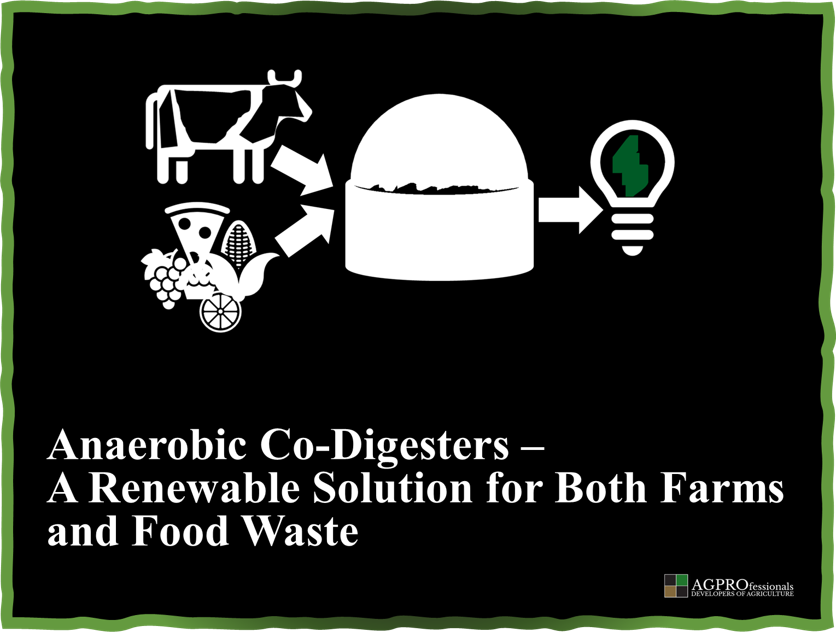Anaerobic Co-DigestionA Renewable Solution for Farms and Food Waste
With the focus on reducing greenhouse gases (GHGs), urban and rural communities across America are looking at their options for managing the waste that is producing methane in our nation’s landfills. According to the Environmental Protection Agency (EPA) in their report, “From Farm to Kitchen: The Environmental Impacts of U.S. Food Waste”, the greenhouse gas emissions from food waste and food loss in the United States are significant. The estimation is that decomposing food and plant matter is equal to the output of 42 coal-fired power plants. In the report, the EPA lists food waste as the “single most common material landfilled and incinerated in the United States, comprising 24 and 22 percent of landfilled and combusted municipal solid waste…”.
Anaerobic Co-Digestion for Small and Mid-Sized Dairies
Anaerobic co-digesters utilize food waste, other organic materials, and manure to prevent methane from escaping into the environment and putting it to work. Co-digesters help keep food waste out of landfills and incinerators and reduce the need for synthetic fertilizers, yielding potentially significant GHG emissions reductions. The technology offered by anaerobic co-digestion is an economical solution that helps farmers and rural and urban communities manage waste products from food production, food processing, grocery stores, restaurants, homes, schools, and other institutions.
For many small and mid-sized dairies, the installation of an anaerobic manure digester on their operation has been cost-prohibitive. Fortunately, co-digestion technology has emerged as a practical and economical way for these dairies to become a part of the GHG and food waste solution, which benefits both urban and rural communities. In addition to helping urban and rural communities become more environmentally responsible, the technology allows smaller and mid-sized dairies to benefit as well.
The benefits include:
- Reducing the carbon footprint of small to midsized dairies
- Creating energy for use on the farm to light and heat buildings and fuel equipment
- Creating natural soil amendments and fertilizer for use on the farm
- Creating bedding for farm animals
- Creating an additional and diversified income stream which is critically important for the survival of small to mid-sized farms through fees received for the management of food waste and other non-farm organic waste products, energy production, and soil amendment and fertilizer sales
Economic Benefits of Anaerobic Co-Digestion for Communities
In addition to managing GHG and providing farmers with a variety of opportunities, anaerobic digesters create economic opportunities for the local community.
These economic opportunities include:
- Construction contracting, including engineering, permitting, planning, and construction, and the use of trades, including site work, concrete, plumbing, and electrical expertise
- Employment, including monitoring and maintenance of the digester
- Cooperative business opportunities for the distribution and sale of co-digestion byproducts, including procurement of organic solids for digestion
Other Benefits of Anaerobic Co-Digestion for Farms and Communities
In addition to economic opportunities, anaerobic co-digesters can benefit farms and communities by:
- Protecting animal and human health by reducing pathogens
- Reducing odors and other impacts, making farm growth more palatable
- Converting nutrients in manure into a form that is more accessible for plants to use compared to raw manure, increasing crop productivity and yield
- Recycling nutrients on the farm, creating an economically and environmentally sustainable food production system
- Accepting food waste from places like restaurants and grocery stores means less food waste is sent to local landfills
- Provide educational experiences for schools and community members about sustainable agricultural practices
Interested in Setting Up an Anaerobic Co-Digester?
At AGPROfessionals, we work with renewable energy companies that offer manure management and diversified income solutions for farmers. We lend our expertise every step of the way, from site selection to planning, engineering, and permitting. If you have questions about manure management and renewable energy solutions, our team is here to help.
Links
EPA article about the benefits of anaerobic digestion HERE
EPA article about the environmental benefits of anaerobic digestion HERE
EPA article about impacts of food waste HERE
Farm Energy Extension article about the environmental benefits of anaerobic digestion HERE
Farm Energy Extension article about anaerobic digesters and biogas safety HERE
Farm Energy Extension article about agronomic use of nutrients from digester effluent HERE
Civil Eats article HERE

